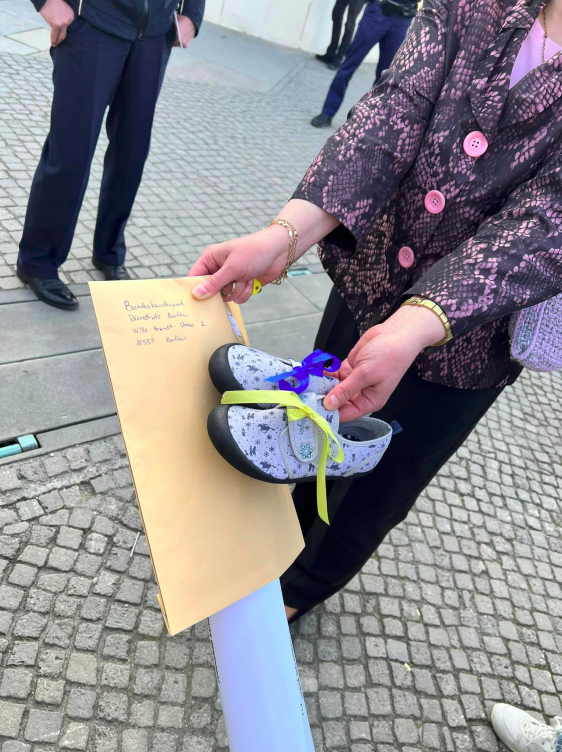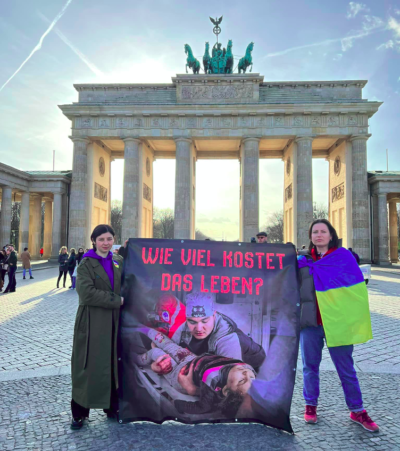Euromaidan Press has reached out to one of the organizers of the protest, Natalka Panchenko, to find out more about the blockade of the trucks, why it ended, what goals were achieved, and what are the next plans of the activists.
The campaign started on 12 March 2022 with the blockade of the Polish-Belarusian border for trucks transiting to Russia. The border was blocked at several checkpoints and the lines of trucks reached dozens of kilometers in length at every entrance to Belarus. The blockade visualized the scope of trade between the EU and Russia with thousands of trucks sitting in endless lines.
The blockade lasted for two weeks and achieved its main goal as the governments of Poland, Lithuania, Latvia, and Estonia officially expressed their readiness to ban trade with Russia by land and sea in response to the Russian invasion of Ukraine. The countries called on the European Commission to impose the EU-wide ban. Yet Germany, France, and Austria refused to halt trade with the Russian Federation, according to Natalka Panchenko.
https://twitter.com/EuromaidanPress/status/1506356311558168588
The letter to Olaf Scholz
“We demand a complete stop of the flow of goods to Russia and its allies. Each transported item only strengthens the Russian regime, spreads terror, and kills innocent people in a free and sovereign state. The eastern border of the EU must be immediately closed to trade with Russia and Belarus," the letter reads.
Together with the letter, the activists handed over the new shoes of the 6-year-old girl Tetiana, who was murdered by the Russian army in Mariupol. These shoes have never been worn – Tetiana didn't have an opportunity to put them on.
"Scholz can sell these shoes, as cynically and in cold blood as he sells all the other goods to Russia which provides the Russians with relative comfort," said Svitlana Maistriuk at a briefing afterwards.

Why the blockade is moving from the Polish-Belarusian border to Germany
“We started the blockade on 12 March 2022. Both Poland and Lithuania have officially responded. Their prime ministers have officially stated that they are against the European Union's trade with Russia. They officially stated that they are ready to close their borders for trade with Russia. But for this they need a decision of the European Union, namely the European Council. At the initiative of the Ministers of Transport of Poland and all the Baltic States, an appeal was made to the Commissioner of the European Council to put an end to this trade as soon as possible. Unfortunately, this decision wasn't adopted due to opposition from Germany, Austria, France, and some other countries,” Natalka Panchenko told Euromaidan Press.
In her opinion, Poland and Lithuania are too small to block the border on their own. They could do it but fear that Russia can respond militarily, so the countries want to be sure that they are not alone. That's why they want the European Council to take this decision in accordance with EU procedures. That's why participants of the blockade are now continuing the campaign in Berlin, Panchenko said. Now they've delivered their letter of appeal to the German Chancellor.
"If Scholz continues to ignore us, we will block the German border through which these trucks enter Poland. Because most goods for Russia are purchased in Western Europe – Germany, Italy, France. It would require a physical blockade of all traffic, so I would not want to disturb people who have nothing to do with trade with Russia. That's why we are asking the Chancellor to take action now to make blockade unnecessary," Natalka says.

Ms. Panchenko says that there are enough people who would join this next stage of the blockade. Activists from different EU countries are ready to support it, including Germany. When the activists were blocking the trucks on the Polish-Belarusian border, several groups of Germans joined the protest as well. They said that they knew from their grandparents what war was and that they are shocked that it is happening now.
“These people from Germany came all the way to block the Polish-Belarusian border. So I think that should we have to block the German border, there will be many activists. There are a lot of people who don't support what is happening now, don't support the policy pursued today by Scholz or Macron,” Panchenko said.
She also explained why the blockade on the Polish-Belarusian border has ended. An ordinary rally in Poland requires only a notification about it, while the blockade of roads requires permission from the authorities. However, another action was announced on the border a month earlier. Since two campaigns cannot take place at the same time, the blockade participants can't obtain new permission right now.
Read more:
- Why the world must stop Putin in Ukraine
- “Germany bears a special responsibility for European security”: Ukrainian Jews appeal to Scholz
- Ukraine should not become a sacrificial lamb to Putin for our illusion of peace
- 1 March 2022 marked the end of “neutrality” in Europe
- The West is finally coming together to confront Russia

